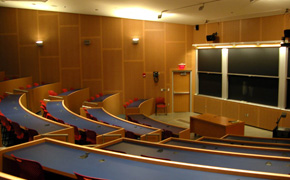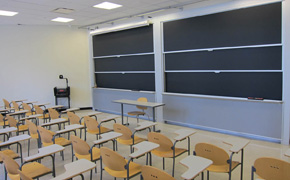Instructor Insights pages are part of the OCW Educator initiative, which seeks to enhance the value of OCW for educators.
Course Overview
This page focuses on the course 20.320 Analysis of Biomolecular and Cellular Systems as it was taught by Professors Forest White and Ernest Fraenkel in Fall 2012.
This course is a required part of the biological engineering undergraduate curriculum. The two central themes of the course are modeling of complex dynamic systems and protein design and engineering.
Course Outcomes
In 20.320, students learn how to analyze biological problems mathematically and computationally in order to guide design decisions. The scale of the problems range from proteins, through cellular signaling pathways to whole-body pharmacokinetics.
Student Information

Enrollment has varied from 40 students to 70 students; during the Fall 2012 semester, 61 students enrolled in this course. Typically, most students taking this course are third-year undergraduates majoring in biological engineering.
Curriculum Information
Prerequisites
- 6.00 Introduction to Computer Science and Programming
- 5.07 Biological Chemistry I or 7.05 General Biochemistry
- 18.03 Differential Equations
- 20.110J Thermodynamics of Biomolecular Systems
All of these courses are required for undergraduate students majoring in Biological Engineering.
Requirements Satisfied
Required for undergraduates majoring in Biological Engineering
Offered
Every fall semester
During an average week, students were expected to spend 12 hours on the course, roughly divided as follows:
Lecture
- Met 2 times per week for 1.5 hours per session; 24 sessions total.
Recitation
- Met 2 times per week for 1 hour per session; 24 sessions total.
- Two sessions were created to accommodate the students’ schedules; both sessions covered the same material.
- Recitations were optional.
Out of Class
- Read the optional reading assignments
- Work on the design projects
- Complete the optional study problems
- Study for exams
Semester Breakdown
| WEEK | M | T | W | Th | F |
|---|---|---|---|---|---|
| 1 |  |  |  |  |  |
| 2 |  |  |  |  |  |
| 3 |  |  |  |  |  |
| 4 |  |  |  |  |  |
| 5 |  |  |  |  |  |
| 6 |  |  |  |  |  |
| 7 |  |  |  |  |  |
| 8 |  |  |  |  |  |
| 9 |  |  |  |  |  |
| 10 |  |  |  |  |  |
| 11 |  |  |  |  |  |
| 12 |  |  |  |  |  |
| 13 |  |  |  |  |  |
| 14 |  |  |  |  |  |
| 15 |  |  |  |  |  |
| 16 |  |  |  |  |  |
 No classes throughout MIT
No classes throughout MIT Lecture session
Lecture session Review session
Review session Exam
Exam No class session scheduled
No class session scheduled Recitation
Recitation Project due date
Project due dateLead Instructors (Prof. Forest White and Prof. Ernest Fraenkel)
- Design and structure the course
- Deliver the lectures
- Hold office hours
Teaching Assistants (two graduate students in biological engineering — Daniel Martin-Alarcon and Allison Claas)
- Attend lectures and take lecture notes
- Lead recitations to supplement lectures
- Hold office hours and exam review sessions


 Room 1 of 2
Room 1 of 2 
